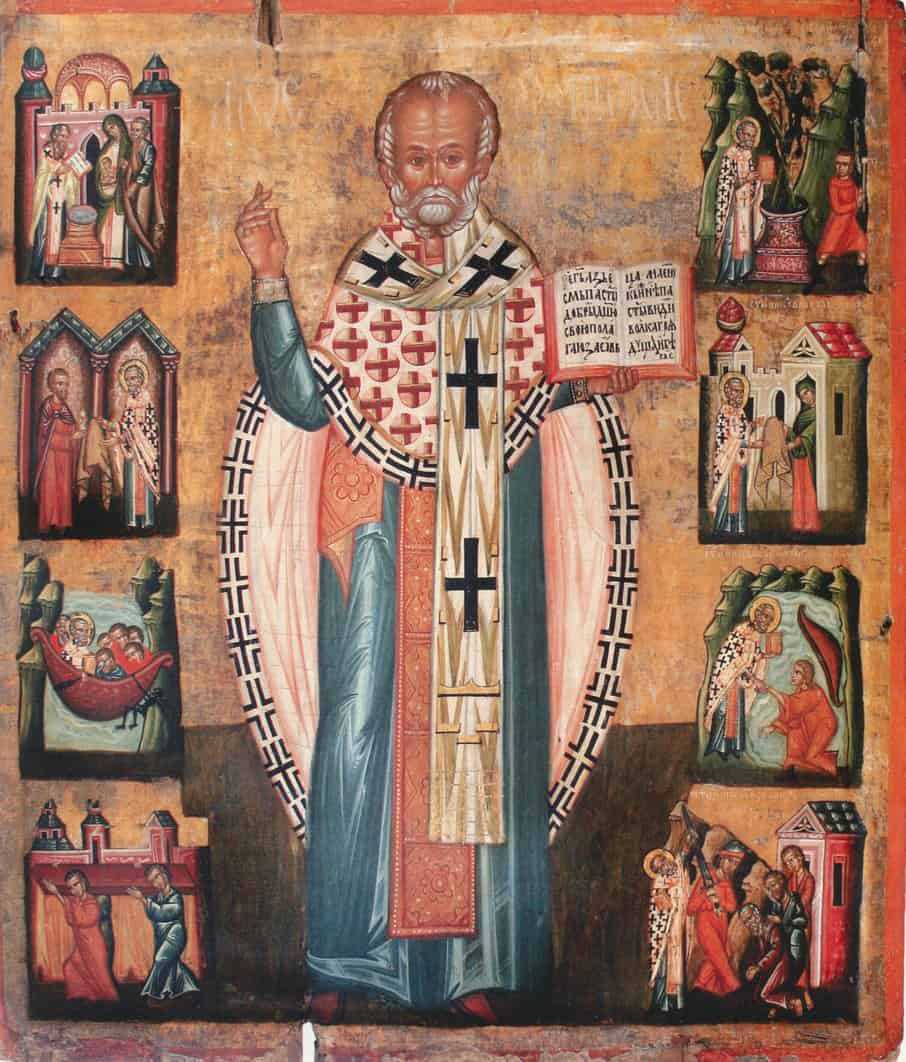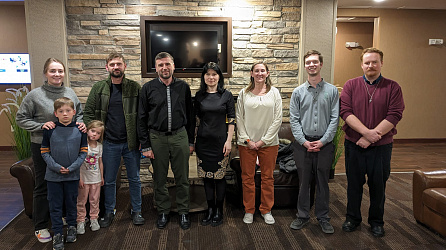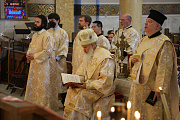The life of st. Nicholas the Wonderworker

Known especially for his generous spirit and great love for the poor and needy, St. Nicholas lived in the region of Lycia in Asia Minor (modern-day Turkey), where he eventually became bishop of the city of Myra. His parents, Theophanes and Nonna, lived in the city of Patara, and were wealthy and well-respected. More importantly, though, they were faithful Christians who dedicated their only son to God. Little Nicholas had an uncle, also named Nicholas, who was the bishop in Patara. The uncle helped to raise his nephew in the spirit of the Christian faith, training him in love for God and others.
While still a young man, Nicholas was ordained to the priesthood by Bishop Nicholas, his uncle. Assisting his uncle in the pastoral ministry in Patara, Nicholas became known for being unusually compassionate and generous. One characteristic story illustrates that generosity, which has now become legendary.
There was a formerly rich man who had fallen into poverty. The man had three daughters. Because he had no dowry to offer any would-be suitors, the man had fallen into despair about what to do with his daughters. He decided to sell them into prostitution, since he considered marriage to be impossible for them. St. Nicholas somehow learned of the man’s intentions, and one night he secretly took a sack of gold with him to the man’s house. He threw the sack through the window into the house, and, as some say, it landed in the stocking, or shoe, of the eldest daughter. Understanding this to be God’s providence, the man then gave that daughter in marriage, with the dowry she had received. St. Nicholas did the same thing two more times, providing sacks of gold for the other two daughters. Though Nicholas tried to keep his giving a secret, the man chased after his family’s benefactor the third time, and discovered who he was.
During a pilgrimage to the Holy Land, St. Nicholas foresaw that the ship on which he sailed would face a dangerous storm. There was indeed a terrible storm, but St. Nicholas averted disaster by his prayers. A sailor who fell from the mast during the storm was injured so badly that he was sure to die. However, again at the prayers of St. Nicholas, the man was miraculously healed. Because of these and many other maritime interventions, St. Nicholas became known even during his lifetime, and ever more so since his repose, as a patron Saint of those at sea, and of all travelers.
While in the Holy Land, Nicholas felt a deep desire to live a life of solitude, completely dedicated to God. He wanted to remain there, living in the desert of Palestine, but the Lord led him to return to Lycia. There he at first tried to live in a monastery, but again he heard the Lord directing him a different way, back into the world to serve the many desperate people in need of God’s mercy and guidance.
So St. Nicholas settled in the town of Myra. There the bishop died, and a council of bishops from the region gathered to choose a successor. One of the bishops had a vision of an Angelic messenger who revealed that on a certain day the first man to arrive at church would have the name, “Nicholas,” and would be the future bishop. Nicholas, who was apparently keeping his priesthood secret at that time, was in the habit of arriving early at church for prayer, and he was indeed the first to arrive that day. The bishop asked his name, and he humbly told him, “My name is Nicholas.” So, in spite of his desire to serve the Lord quietly and humbly, he was consecrated as bishop of Myra.
As bishop, he continued to live a simple life, and continued his works of tender mercy. He also became a zealous defender of his flock against evil and treachery. Gentle towards the lowly, he was a fierce adversary of those who would harm his spiritual children. He stood against the persecution of Diocletian, and suffered imprisonment as a result. In prison, he continued to be a pastor, encouraging his fellow Christians in fetters. He lived through that experience, and when St. Constantine became emperor he was restored as bishop of Myra.
In 325, at the Council of Nicea, St. Nicholas again showed his fiery zeal for the well-being of his spiritual children. When Arius refused to be convinced by the pious teaching of the many holy fathers gathered at that council, St. Nicholas resorted to striking Arius in the face. Thus, our “Santa Claus,” so tender towards children, showed his love for children once again, this time by boldly opposing the snake-like attempt of Arius to lead those children astray.
Some of the clergy at the council were scandalized by Bishop Nicholas’ behavior, and he was temporarily suspended from his duties as bishop and kept in confinement. However, several of the fathers gathered in Nicea had the same vision of both Christ and the Mother of God standing beside St. Nicholas and returning the Gospel book and omophorion (bishop’s vestment) to him. The bishops clearly understood this to indicate that the Lord was pleased with St. Nicholas’ zeal, and accordingly they restored him once again as bishop of Myra.
A further example of the courage and clear-sightedness of St. Nicholas was seen when three men were once falsely convicted of a capital crime. A regional governor had been bribed to convict them in spite of their innocence. Just as they were about to be executed, the bishop arrived at the scene, grabbed the sword of the executioner, which was poised to come down on the neck of one of the men, and explained that the men were innocent. He forcefully denounced the governor for his corruption, and the governor repented and asked for forgiveness, allowing the falsely-accused men to go free.
There are countless other examples of St. Nicholas’ intervention on behalf of those falsely accused, on behalf of those in various kinds of danger, and on behalf of the poor and needy. After a gloriously God-pleasing life, he fell asleep peacefully in the Lord. His body remained incorrupt, and exuded fragrant myrrh, remaining for centuries in the cathedral in Myra. In 1087, his relics were moved from Myra to Bari, Italy, where they remain to this day.
St. Nicholas is a popular patron Saint throughout the world, both among Orthodox Christians and those of other confessions. He is rightly seen as a protector and intercessor for children, as well as for all those in dire need, those falsely accused or convicted, those in prison, and those who travel by land, sea or air. He is an inspiration for those struggling to be faithful to Christ, and his prayers have worked miracles, both during his lifetime, and even more so since his repose. He requested that people pray for his parents, Theophanes and Nonna, and promised his prayers in return. We are blessed to have him as our parish’s patron Saint.
O Holy Father Nicholas, pray to God for us!







